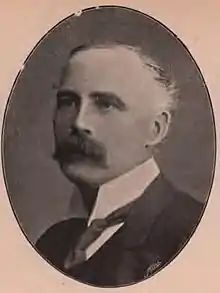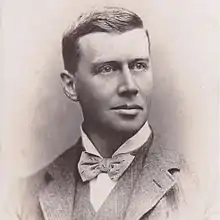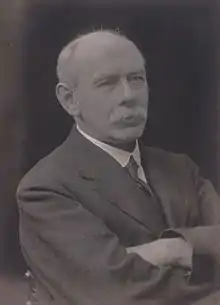Kendal (UK Parliament constituency)
Kendal was a parliamentary borough centred on the town of Kendal in Westmorland. It returned one Member of Parliament (MP) to the House of Commons of the Parliament of the United Kingdom, elected by the first past the post system.
| Kendal | |
|---|---|
| Former Borough constituency for the House of Commons | |
| 1832–1918 | |
| Seats | one |
| Created from | Westmorland |
| Replaced by | Westmorland |
History
The constituency was created by the Reform Act 1832 for the 1832 general election, and abolished for the 1918 general election.
The small Kendal parliamentary borough constituency created in 1832 was abolished in 1885 by the Reform Act 1884. James Cropper, Liberal, being its last MP. The constituency after 1885 was a result of dividing the Westmorland constituency which up to then had two members since 1297. Thereafter it was the Kendal Division of Westmorland and the other being the Appleby Division. The two Conservative members for the old constituency William Lowther and the Earl of Bective were reelected in the 1885 general election, Mr Lowther for the Appleby Division and the Earl of Bective for the Kendal Division. These two constituencies were recombined under one member John Wakefield Weston for the 1918 general election.
Members of Parliament
| Election | Member | Party | |
|---|---|---|---|
| 1832 | James Brougham | Whig[1] | |
| 1834 by-election | John Foster-Barham | Whig[1] | |
| 1837 | George William Wood | Whig[2][3] | |
| 1843 by-election | Henry Warburton | Radical[1][4][5][6][7][8] | |
| 1847 | George Glyn | Whig[9][10][11][12] | |
| 1859 | Liberal | ||
| 1868 | John Whitwell | Liberal | |
| 1880 by-election | James Cropper | Liberal | |
| 1885 | Thomas Taylour | Conservative | |
| 1892 | Josceline Bagot | Conservative | |
| 1906 | Dudley Stewart-Smith | Liberal | |
| January 1910 | Josceline Bagot | Conservative | |
| 1913 by-election | John Weston | Conservative | |
| 1918 | constituency abolished | ||
Elections
| Decades: |
Elections in the 1830s
| Party | Candidate | Votes | % | ||
|---|---|---|---|---|---|
| Whig | James Brougham | Unopposed | |||
| Registered electors | 327 | ||||
| Whig win (new seat) | |||||
Brougham's death caused a by-election.
| Party | Candidate | Votes | % | ||
|---|---|---|---|---|---|
| Whig | John Foster-Barham | Unopposed | |||
| Whig hold | |||||
| Party | Candidate | Votes | % | ||
|---|---|---|---|---|---|
| Whig | John Foster-Barham | Unopposed | |||
| Registered electors | 344 | ||||
| Whig hold | |||||
| Party | Candidate | Votes | % | ||
|---|---|---|---|---|---|
| Whig | George William Wood | Unopposed | |||
| Registered electors | 321 | ||||
| Whig hold | |||||
Elections in the 1840s
| Party | Candidate | Votes | % | ±% | |
|---|---|---|---|---|---|
| Whig | George William Wood | Unopposed | |||
| Registered electors | 353 | ||||
| Whig hold | |||||
Wood's death caused a by-election.
| Party | Candidate | Votes | % | ±% | |
|---|---|---|---|---|---|
| Radical | Henry Warburton | 182 | 60.5 | New | |
| Conservative | George Bentinck | 119 | 39.5 | New | |
| Majority | 63 | 21.0 | N/A | ||
| Turnout | 301 | 81.8 | N/A | ||
| Registered electors | 368 | ||||
| Radical gain from Whig | Swing | N/A | |||
| Party | Candidate | Votes | % | ±% | |
|---|---|---|---|---|---|
| Whig | George Glyn | Unopposed | |||
| Registered electors | 397 | ||||
| Whig hold | |||||
Elections in the 1850s
| Party | Candidate | Votes | % | ±% | |
|---|---|---|---|---|---|
| Whig | George Glyn | Unopposed | |||
| Registered electors | 382 | ||||
| Whig hold | |||||
| Party | Candidate | Votes | % | ±% | |
|---|---|---|---|---|---|
| Whig | George Glyn | Unopposed | |||
| Registered electors | 402 | ||||
| Whig hold | |||||
| Party | Candidate | Votes | % | ±% | |
|---|---|---|---|---|---|
| Liberal | George Glyn | Unopposed | |||
| Registered electors | 432 | ||||
| Liberal hold | |||||
Elections in the 1860s
| Party | Candidate | Votes | % | ±% | |
|---|---|---|---|---|---|
| Liberal | George Glyn | Unopposed | |||
| Registered electors | 439 | ||||
| Liberal hold | |||||
| Party | Candidate | Votes | % | ±% | |
|---|---|---|---|---|---|
| Liberal | John Whitwell | Unopposed | |||
| Registered electors | 1,884 | ||||
| Liberal hold | |||||
Elections in the 1870s
| Party | Candidate | Votes | % | ±% | |
|---|---|---|---|---|---|
| Liberal | John Whitwell | 1,061 | 69.3 | N/A | |
| Conservative | William Allen Francis Saunders[14] | 470 | 30.7 | New | |
| Majority | 591 | 38.6 | N/A | ||
| Turnout | 1,531 | 82.4 | N/A | ||
| Registered electors | 1,859 | ||||
| Liberal hold | Swing | N/A | |||
Elections in the 1880s
| Party | Candidate | Votes | % | ±% | |
|---|---|---|---|---|---|
| Liberal | John Whitwell | 1,118 | 67.4 | −1.9 | |
| Conservative | Alfred Harris[15] | 541 | 32.6 | +1.9 | |
| Majority | 577 | 34.8 | −3.8 | ||
| Turnout | 1,659 | 86.5 | +4.1 | ||
| Registered electors | 1,917 | ||||
| Liberal hold | Swing | −1.9 | |||
Whitwell's death caused a by-election.
| Party | Candidate | Votes | % | ±% | |
|---|---|---|---|---|---|
| Liberal | James Cropper | 953 | 59.3 | −8.1 | |
| Conservative | Alfred Harris[15] | 653 | 40.7 | +8.1 | |
| Majority | 300 | 18.7 | −16.1 | ||
| Turnout | 1,606 | 83.8 | −2.7 | ||
| Registered electors | 1,917 | ||||
| Liberal hold | Swing | −8.1 | |||
| Party | Candidate | Votes | % | ±% | |
|---|---|---|---|---|---|
| Conservative | Thomas Taylour | 2,690 | 52.6 | +20.0 | |
| Liberal | James Cropper | 2,427 | 47.4 | −20.0 | |
| Majority | 263 | 5.2 | N/A | ||
| Turnout | 5,117 | 90.9 | +4.4 | ||
| Registered electors | 5,630 | ||||
| Conservative gain from Liberal | Swing | +20.0 | |||
| Party | Candidate | Votes | % | ±% | |
|---|---|---|---|---|---|
| Conservative | Thomas Taylour | Unopposed | |||
| Conservative hold | |||||
Elections in the 1890s

| Party | Candidate | Votes | % | ±% | |
|---|---|---|---|---|---|
| Conservative | Josceline Bagot | 2,838 | 56.2 | N/A | |
| Liberal | James Anson Farrer[18] | 2,209 | 43.8 | New | |
| Majority | 629 | 12.4 | N/A | ||
| Turnout | 5,047 | 84.1 | N/A | ||
| Registered electors | 6,000 | ||||
| Conservative hold | Swing | N/A | |||
| Party | Candidate | Votes | % | ±% | |
|---|---|---|---|---|---|
| Conservative | Josceline Bagot | 2,771 | 57.5 | +1.3 | |
| Liberal | Herbert Stephenson | 2,049 | 42.8 | −1.0 | |
| Majority | 722 | 15.0 | +2.6 | ||
| Turnout | 4,820 | 79.1 | −5.0 | ||
| Registered electors | 6,095 | ||||
| Conservative hold | Swing | +1.3 | |||
Elections in the 1900s
| Party | Candidate | Votes | % | ±% | |
|---|---|---|---|---|---|
| Conservative | Josceline Bagot | Unopposed | |||
| Conservative hold | |||||

| Party | Candidate | Votes | % | ±% | |
|---|---|---|---|---|---|
| Liberal | Dudley Stewart-Smith | 2,899 | 52.3 | New | |
| Conservative | Josceline Bagot | 2,647 | 47.7 | N/A | |
| Majority | 252 | 4.6 | N/A | ||
| Turnout | 5,546 | 85.6 | N/A | ||
| Registered electors | 6,477 | ||||
| Liberal gain from Conservative | Swing | N/A | |||
Elections in the 1910s
| Party | Candidate | Votes | % | ±% | |
|---|---|---|---|---|---|
| Conservative | Josceline Bagot | 3,228 | 54.2 | +6.5 | |
| Liberal | Dudley Stewart-Smith | 2,726 | 45.8 | −6.5 | |
| Majority | 502 | 8.4 | N/A | ||
| Turnout | 5,954 | 91.0 | +5.4 | ||
| Registered electors | 6,546 | ||||
| Conservative gain from Liberal | Swing | +6.5 | |||

| Party | Candidate | Votes | % | ±% | |
|---|---|---|---|---|---|
| Conservative | Josceline Bagot | 3,041 | 52.7 | −1.5 | |
| Liberal | William Somervell | 2,733 | 47.3 | +1.5 | |
| Majority | 308 | 5.4 | −3.0 | ||
| Turnout | 5,774 | 88.2 | −2.8 | ||
| Registered electors | 6,546 | ||||
| Conservative hold | Swing | −1.5 | |||
| Party | Candidate | Votes | % | ±% | |
|---|---|---|---|---|---|
| Ind. Unionist | John Weston | 3,261 | 54.9 | New | |
| Liberal | William Somervell | 2,680 | 45.1 | -2.2 | |
| Majority | 581 | 9.8 | N/A | ||
| Turnout | 5,941 | 90.4 | +2.2 | ||
| Registered electors | 6,575 | ||||
| Ind. Unionist gain from Conservative | Swing | +2.2 | |||
General Election 1914–15:
Another General Election was required to take place before the end of 1915. The political parties had been making preparations for an election to take place and by the July 1914, the following candidates had been selected;
- Unionist: John Weston
- Liberal: William Somervell[21]
References
- Stooks Smith, Henry (1845). The Parliaments of England, from 1st George I., to the Present Time. Vol II: Oxfordshire to Wales Inclusive. London: Simpkin, Marshall, & Co. p. 104. Retrieved 11 November 2018 – via Google Books.
- "District News". Manchester Courier and Lancashire General Advertiser. 3 July 1841. pp. 2–3. Retrieved 11 November 2018 – via British Newspaper Archive.
- "Election Movements". The Spectator. 8 July 1837. p. 4. Retrieved 11 November 2018.
- Courtney, William Prideaux (1899). . In Lee, Sidney (ed.). Dictionary of National Biography. Vol. 58. London: Smith, Elder & Co.
- Churton, Edward (1838). The Assembled Commons or Parliamentary Biographer: 1838. pp. 231–232. Retrieved 28 October 2018 – via Google Books.
- Leggett, Don (2015). Shaping the Royal Navy: Technology, Authority and Naval Architecture, c.1830–1906. Manchester: Manchester University Press. p. 53. ISBN 978-0-7190-9028-8. Retrieved 28 October 2018 – via Google Books.
- Aspinall, Arthur, ed. (1938). The Letters of King George IV, 1812–1830. Volume III. Cambridge: Cambridge University Press. p. 241. Retrieved 28 October 2018 – via Google Books.
- Huch, Ronald K.; Ziegler, Paul R. (1985). Joseph Hume: The People's M.P. Philadelphia: American Philosophical Society. p. 65. ISBN 0-87169-163-9. LCCN 83-73276. Retrieved 28 October 2018 – via Google Books.
- The Protestant Elector. 1847. p. 124. Retrieved 14 May 2018.
- Baker, Mae; Collins, Michael (2011). "English financial markets in the 1830s". In Wood, Geoffrey; Mills, Terence C.; Crafts, Nicholas (eds.). Monetary and Banking History: Essays in honour of Forrest Capie. Abingdon: Routledge. p. 50. ISBN 978-0-415-45146-8. Retrieved 14 May 2018.
- Robertson, John; Brooke, J. W., eds. (1847). The Monthly railway record. London: Railway Record Office. p. 121. Retrieved 14 May 2018.
- Ollivier, John (1848). "Alphabetical List of the House of Commons". Ollivier's Parliamentary and Political Directory for the Session 1841, 1848, Volume 1. p. 22. Retrieved 14 May 2018.
- Craig, F. W. S., ed. (1977). British Parliamentary Election Results 1832-1885 (e-book) (1st ed.). London: Macmillan Press. ISBN 978-1-349-02349-3.
- "Mr Saunders at Kendal". Lancaster Gazette. 31 January 1874. p. 6. Retrieved 1 January 2018 – via British Newspaper Archive.
- "Representation of Kendal". Edinburgh Evening News. 4 December 1880. p. 3. Retrieved 2 December 2017 – via British Newspaper Archive.
- The Liberal Year Book 1907
- Craig, FWS, ed. (1974). British Parliamentary Election Results: 1885-1918. London: Macmillan Press. ISBN 9781349022984.
- "About local people". Dorking and Leatherhead Advertiser. 11 October 1890. p. 1. Retrieved 22 November 2017.
- Debrett's House of Commons 1901
- Debrett's House of Commons 1916
- Manchester Courier and Lancashire General Advertiser 9 Jul 1914
- Leigh Rayment's Historical List of MPs – Constituencies beginning with "K" (part 1)
- Bulmer's Directory of Westmorland 1885